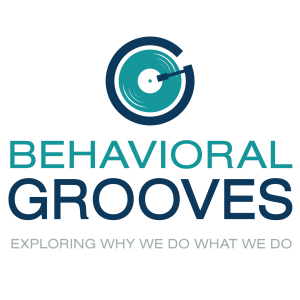
Stories, science and secrets from the world’s brightest thought-leaders. Behavioral Grooves is the podcast that satisfies your curiosity of why we do what we do. Explanations of human behavior that will improve your relationships, your wellbeing, and your organization by helping you find your groove.
Episodes

Monday Sep 26, 2022
Monday Sep 26, 2022
Close your eyes and visualize a horse. Most people can picture the outline of the body, the color of the horse and the unique features of the animal. But some people simply don’t see any image at all. This lack of a mind’s eye is known as aphantasia.
To help explain exactly what aphantasia is, and how it can affect behavior, we talk with Professor Adam Zeman who actually helped identify and name the neurological condition. Adam has a medical degree and a PhD in philosophy from Oxford University. He’s been a lecturer and professor of cognitive and behavioral neurology and has published extensively on visual imagery and forms of amnesia occurring in epilepsy. Adam has also published an introduction to neurology for the general audiences called, A Portrait of the Brain. But the reason we are talking to Adam on this episode is about his research on our “minds eye”. He discusses how a lack of visual imagery (aphantasia) or overly vivid imagery (hyperphantasia) can be identified and what effects it has on our behavior.
We often ask guests on the show about whether their work is influenced by “me-search”; something of particular interest to them personally. Well, this episode is a little bit of me-search for our own Kurt Nelson who himself has aphantasia. Join both Kurt and Tim as they both find out more about the recent research into the condition and how we should all be aware of how it affects people.
Thank you to all our listeners of Behavioral Grooves, we enjoy sharing unique insights with you. If you have enjoyed this episode, please consider writing a review on your podcast player. Or you can contribute financially to our work through our Patreon page: https://www.patreon.com/behavioralgrooves.
Topics
(3:36) Welcome and speed round questions.
(5:15) How Adam discovered the condition aphantasia.
(10:30) How aphantasia can affect all the senses.
(12:45) The prevalence of aphantasia.
(15:38) The behavioral differences that are present with aphantasia.
(19:42) What careers suit people with a lack of mind’s eye?
(23:39) What causes aphantasia?
(25:51) The differences between voluntary and involuntary visualization.
(30:41) Visualization is an echo of vision.
(35:21) What music Adam will take to a desert island.
(37:51) About The Mind’s Eye Project.
(42:49) Grooving Session with Kurt and Tim.
© 2022 Behavioral Grooves
Links
Aphantasia: https://en.wikipedia.org/wiki/Aphantasia
Vividness of Visual Imagery Questionnaire (VVIQ): https://aphantasia.com/vviq/
Professor Adam Zeman: https://psychology.exeter.ac.uk/staff/profile/index.php?web_id=adam_zeman
The Mind’s Eye Project: https://www.gla.ac.uk/research/az/cspe/projects/the-eyes-mind/
“Picture This? Some Just Can’t” by Carl Zimmer, 2015: https://carlzimmer.com/picture-this-some-just-cant-101/
Hyperphantasia: https://en.wikipedia.org/wiki/Hyperphantasia#:~:text=Hyperphantasia%20is%20the%20condition%20of,as%20vivid%20as%20real%20seeing%22.
Ed Catmull: https://en.wikipedia.org/wiki/Edwin_Catmull
Craig Venter: https://www.jcvi.org/about/j-craig-venter
Blake Ross: https://en.wikipedia.org/wiki/Blake_Ross
Think of a horse: https://aphantasia.com/think-of-a-horse/
Musical Links
David Gray “Sail Away”: https://www.youtube.com/watch?v=_oyBnvibWEY
Bach “Cello Suite No.1 in G Major”: https://www.youtube.com/watch?v=1prweT95Mo0
Mendelssohn “Overture: The Hebrides”: https://www.youtube.com/watch?v=MdQyN7MYSN8

Monday Sep 19, 2022
Monday Sep 19, 2022
“The primary source of unconscious priming…is your conscious experience.” Our consciousness is where we bring everything together, where we integrate and form a rich integration of our experience. This result is that this experience gets spread out to all the processes of the mind which is pivotal to how priming, an unconscious effect, actually works.
Dr John Bargh PhD is a researcher and professor at Yale University and is probably the leading researcher on behavioral priming and has been studying this topic for almost 40 years. Not only that but he is a long term friend of Behavioral Grooves Podcast.
In this episode with John, we explore with him both the past and future of priming as well as some of the controversies surrounding it.
“The more important the goal, the more primable it is”
Topics
(4:36) Welcome and speed round questions.
(7:50) Why priming gets a bad rap.
(13:01) What exactly is a prime?
(16:17) Where does future research in priming need to go?
(19:46) How does priming differ from expectation theory and the placebo effect?
(22:33) How is framing not priming?
(24:07) What is the summation of experience?
(32:02) The stupid reason John went into social psychology.
(40:51) What the meta analysis studies on priming have found.
(45:50) Science communication: how to tell the good science from the bad.
(49:03) The importance of podcasting to bridge the gap between science and people.
(1:00:03) Grooving session with Tim and Kurt on priming.
© 2022 Behavioral Grooves
Links
John Bargh's book “Before You Know It: The Unconscious Reasons We Do What We Do”: https://amzn.to/3yUHka8
Episode 248, Do We Control Situations or Do Situations Control Us? With John Bargh: https://behavioralgrooves.com/episode/control-situations-with-john-bargh/
Episode 155, John Bargh: Dante, Coffee and the Unconscious Mind: https://behavioralgrooves.com/episode/john-bargh-unconscious-mind/
Global Workspace Theory: https://en.wikipedia.org/wiki/Global_workspace_theory
Bargh JA. “What have we been priming all these years? On the development, mechanisms, and ecology of nonconscious social behavior.” Eur J Soc Psychol. 2006: https://pubmed.ncbi.nlm.nih.gov/19844598/
Shinobu Kitayama, University of Michigan: https://lsa.umich.edu/psych/people/faculty/kitayama.html
Daphna Oyserman, University of Southern California: https://dornsife.usc.edu/daphna-oyserman
Paul J. Reber, Northwestern University: https://www.reberlab.psych.northwestern.edu/people/paul/
Daniel Schacter, “Amnesia observed: Remembering and forgetting in a natural environment” (1983): https://psycnet.apa.org/record/1983-26025-001
Parafoveal Processing: https://www.sciencedirect.com/topics/psychology/parafoveal-processing
Jeffrey W. Sherman (2017) “A Final Word on Train Wrecks”: https://psychology.ucdavis.edu/people/sherm/cv
Evan Weingarten, Qijia Chen, Maxwell McAdams, Jessica Yi, Justin Hepler, Dolores Albarracin (2016) “On Priming Action: Conclusions from a Meta-Analysis of the Behavioral Effects of Incidentally-Presented Words”: https://pubmed.ncbi.nlm.nih.gov/27957520/
Xiao Chen, Gary P. Latham, Ronald F. Piccolo, Guy Itzchakov (2019) “An Enumerative Review and a Meta-Analysis of Primed Goal Effects on Organizational Behavior”: https://iaap-journals.onlinelibrary.wiley.com/doi/abs/10.1111/apps.12239
Roy F. Baumeister and Kathleen D. Vohs (2003): “Sobriety Epidemic Endangers Nation’s Well-Being”: https://www.psychologicalscience.org/observer/sobriety-epidemic-endangers-nations-well-being
Episode 147, Gary Latham, PhD: Goal Setting, Prompts, Priming, and Skepticism: https://behavioralgrooves.com/episode/gary-latham-goal-setting-prompts/
Musical Links
AC/DC “Hells Bells”: https://www.youtube.com/watch?v=etAIpkdhU9Q
Psychedelic Porn Crumpets “Acid Dent”: https://www.youtube.com/watch?v=OuQyIQ0NA0k
Acid Dad “Searchin’”: https://www.youtube.com/watch?v=PzSwzUAqVWw
The Orb “Blue Room”: https://www.youtube.com/watch?v=TQ8nTbS9mOE
Nirvana “Smells Like Teen Spirit”: https://www.youtube.com/watch?v=hTWKbfoikeg
Pearl Jam “Black”: https://www.youtube.com/watch?v=qgaRVvAKoqQ
The Who “Who You Are”: https://www.youtube.com/watch?v=PNbBDrceCy8
Led Zeppelin “All My Love”: https://www.youtube.com/watch?v=gXC87EABywo
Dead Pirates “Alexis”: https://www.youtube.com/watch?v=o9FsgAyZop4
Hadestown Broadway Show “Way Down Hadestown”: https://www.youtube.com/watch?v=nJIc3RtJK7U
![Rory Sutherland: The Opposite of a Good Idea is a Good Idea [Republish]](https://pbcdn1.podbean.com/imglogo/ep-logo/pbblog2137480/Rory_Sutherland_Headshot_on_Behavioral_Grooves_Podcast_1_b05u5_300x300.jpg)
Monday Sep 12, 2022
Rory Sutherland: The Opposite of a Good Idea is a Good Idea [Republish]
Monday Sep 12, 2022
Monday Sep 12, 2022
Rory Sutherland is a British advertising executive who became fascinated with behavioral science. Between his TED talks, books and articles, he has become one of the field’s greatest proponents. Rory is currently the Executive Creative Director of OgilvyOne, after gigs as vice-chairman of Ogilvy Group UK and co-founder of the Behavioural Sciences Practice, part of the Ogilvy & Mather group of companies. He is the author of The Spectator’s The Wiki Man column and his most recent book, which we highly recommend, is Alchemy: The Dark Art and Curious Science of Creating Magic in Brands, Business, and Life.
Our discussion with Rory was original published in January 2020, but Rory’s evergreen insights continue to be popular with our listeners so we decided to republish this episode. You can also listen to Rory discuss his latest book Transport for Humans: Are We Nearly There Yet? alongside his co-writer Pete Dyson, in episode 290.
We start this discussion with Rory by asking him about his book and some of his insights from it. His approach to advertising, marketing and product design is informed by his ability to look for the things that aren’t there. He once described a solution to improving customer satisfaction on the Chunnel Train between London and Paris by suggesting that a billion dollars would be better spent on supermodel hosts in the cars than on reducing ride time by 15 minutes. He’s a terrifically insightful thinker.
Our conversation ran amok down all sorts of rabbit holes, as expected, including ergodicity, Sir Arthur Conan Doyle’s “The Silver Blaze,” high-end audio and the dietary habits of the world-famous runner, Usain Bolt.
In Kurt and Tim’s Grooving Session, we discuss some of our favorite takeaways from Rory’s conversation including, “The Opposite of a Good Idea is a Good Idea” and others. And finally, Kurt teed up the Bonus Track with a final reflection and recap of the key points we discussed.
As always, we would be grateful if you would write us a quick review. It helps us get noticed by other folks who are interested in podcasts about behavioral science. It will only take 27 seconds. Thank you, and we appreciate your help.
© 2022 Behavioral Grooves
Links
Rory Sutherland: https://ogilvy.co.uk/people/rorys
“Alchemy: The Dark Art and Curious Science of Creating Magic in Brands, Business, and Life”: https://amzn.to/3xbibt3
“Transport for Humans: Are We Nearly There Yet?”: https://amzn.to/3cZPyIy
Episode 290, Transport Your Thinking; Why We Need To Reframe Travel | Rory Sutherland & Pete Dyson: https://behavioralgrooves.com/episode/transport-rory-sutherland-pete-dyson/
“Friction”: https://www.rogerdooley.com/books/friction/
Murray Gell-Mann, PhD: https://en.wikipedia.org/wiki/Murray_Gell-Mann
Robin Williams “Scottish Golf”: https://www.youtube.com/watch?v=jx8TzR1-n4Q
Don Draper: https://en.wikipedia.org/wiki/Don_Draper
Ergodicity: https://en.wikipedia.org/wiki/Ergodicity
John James Cowperthwaite: https://en.wikipedia.org/wiki/John_James_Cowperthwaite
SatNav: https://www.macmillandictionary.com/us/dictionary/american/satnav
Daniel Kahneman, PhD: https://en.wikipedia.org/wiki/Daniel_Kahneman
What You See is All There Is: https://en.wikipedia.org/wiki/Thinking,_Fast_and_Slow
Arthur Conan-Doyle: https://en.wikipedia.org/wiki/Arthur_Conan_Doyle
Sherlock Holmes “Silver Blaze”: https://en.wikipedia.org/wiki/The_Adventure_of_Silver_Blaze
Tim Houlihan’s Blog on “Silver Blaze”: https://tinyurl.com/ufumkj6
Ben Franklin T-Test: https://tinyurl.com/wocdsdk
Volkswagen Fighter: https://tinyurl.com/qpyqh87
David Ogilvy: https://en.wikipedia.org/wiki/David_Ogilvy_(businessman)
Jock Elliot: https://www.theguardian.com/news/2005/dec/01/guardianobituaries.media
Battle of Leyte Gulf: https://en.wikipedia.org/wiki/Battle_of_Leyte_Gulf
Croft Audio: http://www.croftacoustics.co.uk/main.html
Mu-So single speaker: https://www.naimaudio.com/mu-so
WFMT Chicago: https://www.wfmt.com/
TK Maxx: https://www.tkmaxx.com/uk/en/
Berlin Hotel with Big Lebowski: https://www.michelbergerhotel.com/en/
Shure: https://www.shure.com/en-US/products/microphones?lpf[top][types][]=microphones
Zoom: https://zoom.us/
Satisficing: https://en.wikipedia.org/wiki/Satisficing
Usain Bolt: https://en.wikipedia.org/wiki/Usain_Bolt
Sheena Iyengar, PhD: https://www.sheenaiyengar.com/
Jelly Jar Study: https://tinyurl.com/oo6g6eb
Big Band Music: https://en.wikipedia.org/wiki/Big_band
Musical Links
Aretha Franklin: https://en.wikipedia.org/wiki/Aretha_Franklin
Southern California Community Choir: https://en.wikipedia.org/wiki/Southern_California_Community_Choir
Abba: https://en.wikipedia.org/wiki/ABBA
Felix Mendelssohn: https://en.wikipedia.org/wiki/Felix_Mendelssohn
George Frideric Handel: https://en.wikipedia.org/wiki/George_Frideric_Handel
Johann Sebastian Bach: https://en.wikipedia.org/wiki/Johann_Sebastian_Bach
Johann Christian Bach: https://en.wikipedia.org/wiki/Johann_Christian_Bach
![How Good People Fight Bias | Dolly Chugh [Republish]](https://pbcdn1.podbean.com/imglogo/ep-logo/pbblog2137480/Brian_Lowery_Headshot_on_Behavioral_Grooves_Podcast_4_6qz0c_300x300.jpg)
Monday Sep 05, 2022
How Good People Fight Bias | Dolly Chugh [Republish]
Monday Sep 05, 2022
Monday Sep 05, 2022
Psychology and neuroscience have proven that our minds do things on autopilot. These shortcuts (or heuristics) are laden with unconscious biases, which are juxtaposed to our self identity as a “good” person; one that isn’t racist, sexist or homophobic. Dolly Chugh believes we should set a higher standard for ourselves by being good-ish people. By implementing a Growth Mindset, a concept pioneered by Carol Dweck, we don’t hang on too tightly to our identity. We learn to change, and to be taught and to grow.
Dolly Chugh is an award-winning associate professor and social psychologist at the Stern School of Business at New York University. Her research focuses on the “psychology of good people”. How and why most of us, however well-intended, are still prone to race and gender bias, as well as what she calls “bounded ethicality.”
Kurt and Tim sat down with Dolly for this episode in Spring 2021 to talk about the concept of “good-ish” which is a central theme to her book The Person You Mean to Be: How Good People Fight Bias. In subsequent episodes we have referenced Dolly's interview and work many times, so we wanted to republish her episode so you can enjoy listening to her insights again.
In our conversation with Dolly we learn about her beautiful analogy of headwinds and tailwinds that describe the invisible biases and systemic issues that many people in our world face. She explains the “Hmmm Framework” that she came up with after the January 6th Attack on the Capitol. And, of course, we discuss music and how Dolly incorporates it into her teaching and her writing.
In our focused Grooving Session, Tim and Kurt extract the meaningful ways that we can apply Dolly’s work into our everyday lives. We summarize the key parts of our interview with her and how we can each challenge ourselves to find our good-ish groove!
What You Will Learn from Dolly Chugh
(2:41) Speed round questions
(4:12) What is the difference between good and good-ish?
(9:09) Why is a growth mindset so difficult?
(12:28) Why we should integrate psychology more into our educational and political systems
(15:48) How systemic racism and unconscious bias are related
(29:12) Hmmm Framework and thought experiments
(34:04) How do we discover our own blind spots?
(38:58) How Dolly incorporates music into her teaching and writing
(43:21) Applications from our interview with Dolly in our Grooving Session:
- Step back and be intentional, use “when...then…” statements.
- Don’t hold on so tightly to our identity and the status quo.
- Thought experiments to unveil our own ignorance.
- The Harvard Implicit Association Test (IAT).
- Self audit - look at our library, our magazines, our TV shows, what we talk about with friends. How are we showing up in the world? Are we being intentional with where we put our effort?
© 2022 Behavioral Grooves
Links
Dolly Chugh: http://www.dollychugh.com/about-dolly
Dolly Chugh, The Person You Mean to Be: How Good People Fight Bias https://amzn.to/35tGwMe
Carol Dweck, Mindset, The New Psychology of Success https://amzn.to/3wDv10I
Episode 196: Living Happier By Making the World Better with Max Bazerman https://behavioralgrooves.com/episode/living-happier-by-making-the-world-better-with-max-bazerman/
Mahzarin Banaji https://psychology.fas.harvard.edu/people/mahzarin-r-banaji
Molly Kern https://www.molly-kern.com/
Happy Days https://www.youtube.com/watch?v=Ee0gziqT2Yk&ab_channel=ChiefScheiderChiefScheider
Grey’s Anatomy https://youtu.be/dSGLObjyFvA
Steve Martin and Nuala Walsh, Episode 209: GAABS and Improving the Future for Every Applied Behavioral Scientist https://behavioralgrooves.com/episode/improving-the-future-for-every-applied-behavioral-scientist/
Katy Milkman, How to Change https://amzn.to/3wDZHzc
Confronting the legacy of housing discrimination https://www.cbs.com/shows/cbs_this_morning/video/vLnaRgBIed_ph_NxZa2ZaivfdC_FeD1f/white-americans-confront-legacy-of-housing-discrimination/
Harvard Implicit Association Test https://implicit.harvard.edu/implicit/
Alec Lacamoire https://en.wikipedia.org/wiki/Alex_Lacamoire
Lake Wobegon Effect https://en.wikipedia.org/wiki/Lake_Wobegon
Episode 214: Observing the Non-Obvious: How to Spot Trends Around You with Rohit Bhargava https://behavioralgrooves.com/episode/the-non-obvious-rohit-bhargava/
Musical Links
Hamilton “Alexander Hamilton” https://youtu.be/VhinPd5RRJw
In the Heights “Blackout” https://youtu.be/T0V2cCjf1Tk
Something Rotten! “A Musical” https://youtu.be/1KFNcy9VjQI
Bruno Mars “The Lazy Song” https://youtu.be/fLexgOxsZu0
38 Special “Hold On Loosely” https://www.youtube.com/watch?v=vJtf7R_oVaw
Buffalo Springfield “For What It’s Worth” https://youtu.be/80_39eAx3z8

Friday Sep 02, 2022
Groove Track | No, Short-Term Rewards Don’t Drain Long-Term Motivation
Friday Sep 02, 2022
Friday Sep 02, 2022
For many years, the general consensus by many researchers and practitioners was that providing people with short-term extrinsic rewards sapped their long-term motivation. This led to some organizations reducing or not using short-term rewards at all. However, this perspective has always had some detractors and now even more research shows that this belief is misleading.
In this episode, Kurt and Tim explore the research paper by Indranil Goswami and Oleg Urmisky with the lovely title of “The Dynamic Effect of Incentives on Post-Reward Task Engagement” that shows that while short-term incentives drive an immediate reduction in task engagement, this only lasts for a short time and that engagement rebounds to the baseline relatively quickly.
We examine some of the backstory to this belief, what the study showed, and review the implications of this.
Links
The Dynamic Effect of Incentives on Post-Reward Task Engagement: https://www.researchgate.net/publication/312100138_The_dynamic_effect_of_incentives_on_postreward_task_engagement
© 2022 Behavioral Grooves
![The Power of Unity: Robert Cialdini Expands His Best Selling Book Influence [Republish]](https://pbcdn1.podbean.com/imglogo/ep-logo/pbblog2137480/Robert_Cialdini_Behavioral_Grooves_300x300.jpg)
Monday Aug 29, 2022
Monday Aug 29, 2022
The GodFather of Influence, Robert Cialdini joins us on Behavioral Grooves to share his motivation for expanding his bestselling book Influence: The Psychology of Persuasion which now includes a completely new Seventh Principle of Influence: Unity. This additional principle can help explain our political loyalties, vaccine hesitancy and why media headlines can be so inflammatory.
Another motivation for the revised edition to the book is to include more application to the Principles of Influence. So our conversation highlights some of Bob’s advice for start-up businesses and how they can harness the principle of Social Proof. And as general advice, Bob recounts how he recently advised a teenager to be generous to others – this in turn stimulates the Rule of Reciprocity, nurturing a relationship which is mutually beneficial.
No episode of Behavioral Grooves would be complete without discussing music, even with guests we’ve interviewed before! But the theme of unity has a special significance with music and Bob highlights how music and dance bring people together and help them feel unified. Plus we get an interesting story of an experiment in France, and how a guitar case played a crucial part in one man’s luck.
We hope you enjoy our discussion with The Godfather of Influence, Robert Cialdini. Since we generously share our great content with you, perhaps you feel influenced by the Rule of Reciprocity and will become a Behavioral Grooves Patreon Member!
[This episode was originally published in May 2021 and you can also listen to our first interview with Robert Cialdini in Episode 50].
© 2022 Behavioral Grooves
Topics we Discuss on Influence with Robert Cialdini
(3:55) Speed round
(6:50) Ideal number of stars on your online review
(9:00) Why Cialdini wrote a new edition of Influence
(12:13) The new Seventh Principle: Unity
(15:10) How to harness social proof as a start-up
(20:02) A new color of lies
(22:22) Principle of Unity with politics
(24:42) Tribalism and vaccine hesitancy
(28:35) Why Trump getting vaccinated hasn’t influenced his voters
(30:50) How framing of media headlines influences our perception of the news
(33:24) The Petrified Forest Wood Principle
(36:56) Where will the next generation of research go with Cialdini’s work?
(40:52) What advice would Cialdini give your teenager?
(48:23) Music and influence
(53:05) Grooving session
Robert Cialdini’s Books
Influence, New and Expanded: The Psychology of Persuasion https://amzn.to/3tyCpZ6
Pre-Suasion: A Revolutionary Way to Influence and Persuade https://amzn.to/3eGdyOW
Links
Episode 50: Robert Cialdini, PhD: Littering, Egoism and Aretha Franklin: https://behavioralgrooves.com/episode/robert-cialdini-phd-littering-egoism-and-aretha-franklin/
Increase Your Influence: https://www.influenceatwork.com/
Godfather 2 Movie: https://en.wikipedia.org/wiki/The_Godfather_Part_II
Richard Thaler: https://en.wikipedia.org/wiki/Richard_Thaler
Daniel Kahneman: https://en.wikipedia.org/wiki/Daniel_Kahneman
Episode 222: How Delusions Can Actually Be Useful: Shankar Vedantam Reveals How: https://behavioralgrooves.com/episode/shankar-vedantam-useful-delusions/
Donald Trump vaccine: https://www.forbes.com/sites/jackbrewster/2021/04/20/trump-i-dont-know-why-republicans-are-vaccine-hesitant-again-floats-pfizer-conspiracy-theory/
Mike Pence: https://www.nbcnews.com/politics/white-house/pence-set-receive-covid-vaccine-televised-appearance-n1251655
Petrified Forest Wood Principle: https://www.psychologytoday.com/gb/blog/the-shaping-us/201909/the-petrified-wood-principle
Stanley Schachter: https://en.wikipedia.org/wiki/Stanley_Schachter
Jerome Singer: https://en.wikipedia.org/wiki/Jerome_E._Singer
Episode 220: How Do You Become Influential? Jon Levy Reveals His Surprising Secrets: https://behavioralgrooves.com/episode/how-to-be-influential-jon-levy/
The psychology of misinformation: Why it’s so hard to correct: https://firstdraftnews.org/latest/the-psychology-of-misinformation-why-its-so-hard-to-correct/
How to combat fake news and misinformation: https://www.brookings.edu/research/how-to-combat-fake-news-and-disinformation/
Teaching skills to combat fake news and misinformation: https://www.washington.edu/trends/teaching-skills-to-combat-fake-news-and-misinformation/
Episode 102: Cristina Bicchieri: Social Norms are Bundles of Expectations: https://behavioralgrooves.com/episode/cristina-bicchieri-social-norms-are-bundles-of-expectations/
Episode 214: Observing the Non-Obvious: How to Spot Trends Around You with Rohit Bhargava: https://behavioralgrooves.com/episode/the-non-obvious-rohit-bhargava/
Behavioral Grooves Patreon: https://www.patreon.com/behavioralgrooves

Thursday Aug 25, 2022
Groove Track | 12 Words That Improve Company Performance
Thursday Aug 25, 2022
Thursday Aug 25, 2022
Priming studies have had some negative press over the past ten years - some of it justified, some of it not. In this groove track, Kurt and Tim examine a 2018 study done by Alexander Stajkovic, Kayla Sergent, Gary Latham, and Suzanne Peterson called “Prime and Performance: Can a CEO Motivate Employees Without Their Awareness?”
This field study, with real-world implications, demonstrated that the choice of words had an impact on company performance. The impact was not just statistically significant, but it had real-world significance as well. The researchers replaced 12 words in a company President’s e-mail message to his employees. The impact that those 12 words had on performance was wild.
Kurt and Tim examine how the study was set up, the type of priming used, how performance was measured, and explore some of the key findings. We try to peel back the reasons why the interventions worked as it did, and discuss both the positive implications of this study, as well as things we should be wary of.
Listen now or find out more about this paper in our blog post. Enjoy!
![Delusions Can Actually Be Useful: Hidden Brain’s Shankar Vedantam Reveals How [Republish]](https://pbcdn1.podbean.com/imglogo/ep-logo/pbblog2137480/Shankar_Vedantam_Hidden_Brain_Behavioral_Grooves_Podcast6d2q7_300x300.jpg)
Monday Aug 22, 2022
Monday Aug 22, 2022
Shankar Vedantam is the host of the wildly popular podcast, Hidden Brain and esteemed author of the book Useful Delusions: The Power and Paradox of the Self-Deceiving Brain. We initially interviewed Shankar in mid 2021 but want to highlight this discussion for you again as it is one we still discuss in more recent episodes.
Before reading Shankar’s book and interviewing him for this podcast we were, as Shankar describes himself, card-carrying rationalists. We were firmly in the camp of believing rational, scientific findings and believing that lies and deception are harmful to ourselves and to our communities. However, Shankar walks us through a compelling argument, that paradoxically, self-deception actually plays a pivotal role in our happiness and well-being.
In our discussion with Shankar we cover:
- (6:38) Speed round questions.
- (11:04) The difference between self delusions being useful and being harmful.
- (16:23) How nations are a delusional construct.
- (23:00) Awareness of self-delusions and how daily gratitudes can shift our perspective of the world.
- (25:56) Shankar’s personal story of delusional thinking.
- (29:58) The role emotions play in our mood and delusions.
- (35:23) How avoidance of delusional thinking is a sign of privilege.
- (37:30) Why our perceptions play an important role in understanding delusions.
- (44:36) Shankar’s unique approach to conspiracy theories.
- (52:28) What music Shankar has been listening to during COVID.
- (52:15) Grooving Session and Bonus Track with Kurt and Tim.
We really hope you find Shankar’s unique insight on how delusions are useful as compelling as we did. If you’re a regular Behavioral Grooves listener, please consider supporting us through Patreon. Thank you!
© 2022 Behavioral Grooves
Books
- Useful Delusions: The Power and Paradox of the Self-Deceiving Brain https://amzn.to/2PUkzlv
- The Hidden Brain: How Our Unconscious Minds Elect Presidents, Control Markets, Wage Wars and Save Our Lives https://amzn.to/3e1qgWY
Links
Noise: A Flaw in Human Judgment by Kahneman, Sibony and Sunstein, 2021 https://amzn.to/3heyr5r
Richard Dawkins https://richarddawkins.net/
Mahabharata https://en.wikipedia.org/wiki/Mahabharata
Lake Wobegon Effect https://en.wikipedia.org/wiki/Lake_Wobegon
Other Episodes We Talk About
The Myth of the “Relationship Spark” with Logan Ury (featuring a guest appearance by Christina Gravert, PhD): https://behavioralgrooves.com/episode/the-myth-of-the-relationship-spark-with-logan-ury-featuring-a-guest-appearance-by-christina-gravert-phd/
Robert Cialdini, PhD: Littering, Egoism and Aretha Franklin: https://behavioralgrooves.com/episode/robert-cialdini-phd-littering-egoism-and-aretha-franklin/
Self Control, Belonging, and Why Your Most Dedicated Employees Are the Ones To Watch Out For with Roy Baumeister: https://behavioralgrooves.com/episode/self-control-belonging-and-why-your-most-dedicated-employees-are-the-ones-to-watch-out-for-with-roy-baumeister/
George Loewenstein: On a Functional Theory of Boredom: https://behavioralgrooves.com/episode/george-loewenstein-on-a-functional-theory-of-boredom/
Gary Latham, PhD: Goal Setting, Prompts, Priming, and Skepticism: https://behavioralgrooves.com/episode/gary-latham-phd-goal-setting-prompts-priming-and-skepticism/
John Bargh: Dante, Coffee and the Unconscious Mind: https://behavioralgrooves.com/episode/john-bargh-dante-coffee-and-the-unconscious-mind/
Linda Thunstrom: Are Thoughts and Prayers Empty Gestures to Suffering Disaster Victims? https://behavioralgrooves.com/episode/linda-thunstrom-are-thoughts-and-prayers-empty-gestures-to-suffering-disaster-victims/

Monday Aug 15, 2022
How To Find Meaning IN Life | Dr Brian Lowery PhD
Monday Aug 15, 2022
Monday Aug 15, 2022
Three things generate a sense of meaning IN life;
- Coherence - can you make sense of the world?
- Purpose - do you feel a sense of purpose with what you do? And
- Significance - does your life matter?
Having meaning in your life is correlated with a sense of self certainty. Knowing who you are and having a sense of self, gives you structure and a stable way of seeing the world.
But how do you answer the question “who am I?” Our guest, Dr Brian Lowery PhD says the answer isn’t as individualistic as we may have been led to believe. Not only do those around us; our friends, co-workers and parents contribute to who we are, Brian claims they actually create who we are. Putting it bluntly, there is no way of separating “you” from your relationships.
We’ve waited a long time to talk to Brian, who is the Walter Kenneth Kilpatrick Professor of Organizational Behavior at the Stanford Graduate School of Business. He is a social psychologist by training, but Brian’s work is by no means traditional in that field. He studies how individuals perceive inequality, and his research explores individuals' experiences of inequality and fairness in a way that sheds light on intergroup conflict and the nature of social justice. Brian is also a fellow podcaster, hosting the show Know What You See which is definitely worth checking out.
Listeners can become a Behavioral Grooves supporter by donating to our work through Patreon. Or please consider writing us a podcast review on your app. Thanks!
Topics
(5:21) Welcome to Brian Lowery and speed round questions.
(7:34) The meaning IN life vs. the meaning OF life.
(9:23) How meaning in life is linked to a sense of self certainty.
(13:30) Context matters: those around us create who we are.
(17:13) What are you referring to when you talk about you?
(19:23) The responsibility we have when interacting with others.
(21:27) Does authenticity assume a stability of self?
(26:17) Our relationships define us while also limiting our freedom.
(30:59) The myth of rugged individualism.
(36:35) Do we really have freewill?
(42:06) What Brian talks about on his podcast, Know What You See.
(43:42) What role does music play in the identity of self?
(51:43) Grooving Session with Kurt and Tim discussing the meaning in life.
© 2022 Behavioral Grooves
Links
Know What You See Podcast: https://podcasts.apple.com/us/podcast/know-what-you-see-with-brian-lowery/id1580636076
Monty Python’s The Meaning Of Life: https://www.youtube.com/watch?v=LAwDWZoETk4&ab_channel=MontyPython
Episode 67, George Loewenstein: On a Functional Theory of Boredom: https://behavioralgrooves.com/episode/george-loewenstein-on-a-functional-theory-of-boredom/
Episode 248, John Bargh: Do We Control Situations or Do Situations Control Us? https://behavioralgrooves.com/episode/control-situations-with-john-bargh/
Kimberle Crenshaw: https://www.law.columbia.edu/faculty/kimberle-w-crenshaw
Episode 307, Groove Track | Mind Over Milkshakes: Why Expectations Matter A Lot: https://behavioralgrooves.com/episode/mind-over-milkshakes-groove-track/
Behavioral Grooves Patreon: https://www.patreon.com/behavioralgrooves
Musical Links
Killer Mike “Untitled”: https://www.youtube.com/watch?v=lNsAfGDkUtk

Monday Aug 08, 2022
How Do Incentives Actually Impact Motivation? | Dr Indranil Goswami PhD
Monday Aug 08, 2022
Monday Aug 08, 2022
Incentives can improve motivation. But what actually happens when the incentive is removed? An influential body of research previously suggested that extrinsic rewards have a negative impact on intrinsic motivation. However, more recent studies show this not to be the case over the long term. Our guest, Dr Indranil Goswami PhD, talks us through the longer term effects of temporary incentives and the implications for motivating behavior change.
Indranil is an Assistant Professor of Marketing at the University at Buffalo. The research that we focus on in this episode is the paper he co-wrote with Dr Oleg Urminsky PhD, called “The Dynamic Effect of Incentives on Post-Reward Task Engagement”.
While there may be a dose of confirmation bias with this conversation, Kurt and Tim are excited to hear more about Indranil’s research which backs up what they have been telling companies for years:
“Incentives are useful for improving people's behavior, engagement and performance.”
Managers, academics and even parents have bought into the widely held belief that extrinsic motivators are not a useful tool for initiating behavior change. But Indranil’s work may help you reevaluate the tools you use to motivate those around you. Listen in and let us know if it encourages you to rethink your incentive program.
Regular listeners to Behavioral Grooves may enjoy being part of our exclusive group of Patreon members by supporting our work. You can also write a review of our podcast on whatever platform you listen on, and we often read these out on the show. Thank you!
Topics
(2:49) Welcome and speed round questions.
(4:00) Do extrinsic incentives always suppress intrinsic motivation?
(9:41) Does post incentive disengagement actually happen?
(16:59) The surprising effect of big incentives.
(22:42) Real world experiences of incentives.
(25:03) Can we design incentives that improve post reward performance?
(31:40) What is more motivating - flat fee payment schemes or rate based payment scheme?
(38:57) Does Indranil use music as motivation?
(43:18) Grooving Session with Kurt and Tim on rewards and motivation.
© 2022 Behavioral Grooves
Links
Goswami I, Urminsky O (2017) The dynamic effect of incentives on postreward task engagement: https://pubmed.ncbi.nlm.nih.gov/28054810/
Daniel Kahneman: https://en.wikipedia.org/wiki/Daniel_Kahneman
Dan Ariely: https://danariely.com/
Eisenberger, R., & Cameron, J. (1996) Detrimental effects of reward: Reality or myth? https://doi.org/10.1037/0003-066X.51.11.1153
Dan Ariely, Uri Gneezy, George Loewenstein, Nina Mazar (2009) Large Stakes and Big Mistakes: https://doi.org/10.1111/j.1467-937X.2009.00534.x
Episode 106, Jana Gallus: The Role of Precision in Incentives: https://behavioralgrooves.com/episode/jana-gallus-the-role-of-precision-in-incentives/
Goswami, Indranil and Urminsky, Oleg (2018). Don't Fear the Meter: How Longer Time Limits Yield Biased Preferences for Flat Fee Contracts: http://dx.doi.org/10.2139/ssrn.3448174
Episode 71, Alex Imas: Clawback Incentives and Tom Waits: https://behavioralgrooves.com/episode/alex-imas-clawback-incentives-and-tom-waits/
Behavioral Grooves Patreon: https://www.patreon.com/behavioralgrooves
Musical Links
Ravi Shankar “The Spirit of India”: https://www.youtube.com/watch?v=gMk2eTqPLWk
